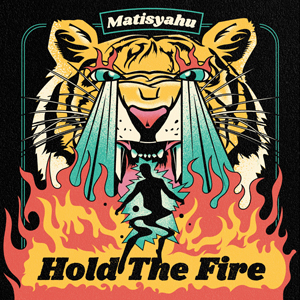By Peter Lindblad
Waking up from a wild dream, Matisyahu took a moment to try to understand its meaning. The deeper he looked, the more layers he discovered.
Eventually, the vivid and cinematic images it produced seeped into the lyrics for the second verse of “Fireproof,” the meditative and inspiring lead track from the alternative reggae/hip hop artist’s latest five-song EP, Hold the Fire. The religious implications were inescapable.
“I was in a synagogue, and I was playing with a tiger and the mother tiger was shooting fire out of her eyes at me, and I was in flames,” recalled Matisyahu, born Matthew Paul Miller. “Then I realized I wasn’t being consumed by the fire – like the burning bush came into my mind, and I was like analyzing the dream and thinking about it, it was like wow! This is about the burning bush of fire, which doesn’t consume itself.”
Matisyahu – who is scheduled to perform at The Pabst Theater in Milwaukee on Thursday, March 7 – suddenly felt a closeness with Moses, while sensing that his artistic mission was coming into greater focus.
“So, the burning bush is where God speaks to Moshe, to Moses, and Moshe means drawn from the water,” said Matisyahu. “So, they say he was a humble prophet … these qualities of fire and water, and that’s part of where his success was, or why he was able to speak with God. That became kind of like a theme for me moving forward into my thirties and forties. As an artist, how do you continue to be inspired and not just let the fire go out? How do you not try to get caught up and burned up in your own flames? How do you hold the fire. So, that became the theme of the EP and ‘Fireproof,’ as well, for sure.”
Part and parcel of his spiritual, genre-fluid musical identity, Matisyahu’s Jewish beliefs fuel his creativity, which embraces hip hop and reggae, as well as exotic pop stylings and alternative-rock. His energetic stage show is an awakening, baptizing concertgoers in a warm flood of powerful, ever-evolving sounds and grooves. When it’s over, they’re supposed to be exhilarated.
“I hope they leave with a feeling of joy, to be honest with you,” said Matisyahu. “When we walk out of a concert, and you have that ecstatic kind of feeling, like you just went through something, and you danced and you sweated and you emoted and connected with all the people around you, it’s a pretty elating feeling when you leave a concert. And it feels good, and it feels right.”
Not surprisingly, Matisyahu was despondent after the events of Oct. 7, when Hamas terrorists attacked Israel, killing more than a thousand Israelis and taking hostages.
“I was feeling a bit hopeless in the months following Oct. 7 from everything I was watching on the news and seeing around us, and going to Israel definitely gave me an inspiration,” said Matisyahu. “It gave me a sense of hope and a sense of divine purpose, I would say. What I’ve been able to take from that and bring that back with me onto my tour bus as we go from city to city, we’ve seen challenges. And that’s a big part of what gives me the strength when I think about soldiers in Israel that are defending the civilians, and the people who were attacked at the music festival, what they went through, hearing firsthand stories and talking to families of hostages and hearing their stories, it was very powerful. I felt blessed that I was able to go there and experience firsthand what some of my people have gone through.”
Since that day, Matisyahu has been a lightning rod for controversy, with some going so far as to try to cancel his shows and more. Visiting Israel in January, performing a sold-out benefit show in Tel Aviv and participating in the March for Israel in Washington D.C., where he played his global anthem “One Day” with The Maccabeats, steeled his resolve.
“These have been powerful experiences for me and coming into this tour, after Oct. 7 and what’s going on in the world, knowing that there might be some antagonizing people that are trying to stop performances and mess with my fans, or spread false ideas about how I am,” said Matisyahu. “So, I was kind of a bit prepared for it. I’ve been through over the years some different things, so … learning how to try to stay calm and make good decisions, and not be silenced and keep playing my music, going to Israel was a big part of that.”
Soon, Matisyahu will be releasing in March a new single called “Ascent,” which addresses antisemitism. He is doing what he can to fight it.
“Some of that is what I’m doing here, doing these interviews and talking and things like that, but the way that I see my mission in this world is not really intellectualizing or explaining the situation,” said Matisyahu. “It’s more of an emotional thing, which is something I think people feel when they come to my show. They feel connected. They don’t feel pushed away. They don’t feel the separation. I think they feel unity, and the songs that I sing, where they come from, and I think people relate to that in a lot of ways, so I think that the mission for me is just to continue playing music and expressing myself, the feelings, give people a place to feel proud of being Jewish, where they don’t have to feel ashamed that they have love for Israel or that the word ‘Zionist’ is not a bad word.”
Taking pride in being Jewish is something that the Grammy-nominated Matisyahu sees as crucial to his sense of self. Raised in the religion, a young Matisyahu – then Miller – attended Hebrew school in White Plains, New York. Pushing against the constraints of Judaism, he got into jam bands, like Phish and The Grateful Dead, but when he discovered reggae, and Bob Marley in particular, he had an epiphany. The realization that Rastafarianism and Judaism were very much alike in many ways hit home. And he went to work to get a music career underway.
“I guess when I was 18 or 19 years old, I lived in Bend, Oregon, and I started performing and doing music and kind of like getting experience being in front of people and a microphone on a small stage or something – you know, freestyling and improvising, creating music,” said Matisyahu. “And I had a little band there that eventually moved back to New York, and when I was in New York, I was trying to put another band together, but when you’re in a small town, it’s much easier to find the guy with dreadlocks and start a band.”
Seeing that getting a group together was going to be easier said than done, Matisyahu tried something different.
“What I ended up doing was spending a lot of time by myself, in my room, practicing, and when I saw practicing, what I would do was smoke blunts, essentially,” said Matisyahu. “I purchased instrumental cassettes on Canal Street downtown where you could find all the current and popular hip-hop beats that were out, with no vocals, and I would play those back through my speakers, and I would write, and I would sing and rap into a microphone during the daytime when everyone was at school and stuff. And I spent hours and hours doing that, and at some point, I would end up going to an open mic or something like that, and I’d get the band to play (Bob Marley and The Wailers’) ‘No Woman, No Cry’ and I would rap over it, like that dancehall cadence, that kind of flow.”
The overwhelmingly positive response floored him, but at the same time, he was on a journey of self-discovery, trying to find an aspect of Judaism that fit best.
“At that point, I was not Hassidic, but I was just … shaggy brown hair, you know, kind of a goofy, tall kid, and people would be blown away,” said Matisyahu.
Eminem had opened doors for white hip-hop artists, but for a time, Matisyahu couldn’t get his career untracked.
“At that point, I was just kind of struggling, and it seemed like people didn’t necessarily get it, like what I was doing,” said Matisyahu. “And I felt like I needed to somehow go and … [find] something that was in the inner thing, chasing after, running after record companies, trying to convince people why they should care. So, then I stopped everything and just started praying, became Hassidic and moved to Crown Heights, and started learning Torah and stopped listening to music and just became a monk and was super religious. So, if it was meant to be, it was to serve God in that way. Then it would happen, and it just did. And it just happened that quickly and that miraculously.”
Combining reggae with a Judaic philosophy, Matisyahu released his first two studio records, but it was 2005’s Gold-certified Live at Stubb’s that broke him into the mainstream. In 2006, Matisyahu’s Youth earned a No. 1 Billboard spot, thanks to the smash hit “King Without a Crown.” Three years later, he uncorked the antiwar anthem “One Day,” which reached Gold status. His sound became a worldly amalgam of styles, as 2014’s Akeda crashed Billboard’s Top 10 in four categories, including rap, rock, independent and modern rock/alternative.
Hopping lithely across different genres keeps Matisyahu’s music eclectic, fresh and exciting, and the Milwaukee show promises to take the audience on an engrossing and thorough trip through all the twists and turns of a fascinating career.
“Yeah, I’ve been doing about this 200 shows a year for 20 years now, so I would say the show has definitely evolved, the music has evolved, and I myself have gone through various stages,” said Matisyahu.
Original guitarist Aaron Dugan is back in the fold.
“We met in college 25 years ago and started playing together,” said Matisyahu. “He’s been kind of my soulmate musically throughout the years – being an improviser with a jazz background, from Live at Stubb’s, he has all the reggae chops and all of that, but he’s a really incredible musician. I love having him with me.”
On bass is a guy named “Porch,” whose background is mostly roots reggae.
“And then on rhythm guitar and keyboards and drums, I have three members of a band called Sideways,” said Matisyahu. “It’s a Santa Barbara … kind of like I would say sort of a punk rock/reggae, So Cal reggae tradition – good songs and stuff, and they’re great guys. And they’re opening up the tour, but they fill in with me on background. So, their songs are a mixture. Sometimes we’re dealing with playing four or five new songs and then playing some of the classics, or the hits, and then mixing in some more obscure songs and some improvising as well.”
A bit of alchemy is required when Matisyahu is compiling a set list. “Fireproof,” influenced by all the afro-pop Matisyahu’s been listening to, is likely to be on it. “So, like for example, for a while we were starting the set with ‘Jerusalem,’ which is a song everybody knows,” said Matisyahu. “And then, going from that into a song called ‘Live Like a Warrior,’ off the album Spark Seeker, which is another kind of feel-good hit song, and then ramping up a little bit into ‘Youth’ and then ‘Sunshine,’ playing some new songs. I have a new song called ‘Lifeline’ that I really enjoyed playing. So, it’s really a blend. I would say right now my show is the most blended that it’s ever been. It doesn’t lean too heavily into one particular thing – kind of a mixture of things.”


